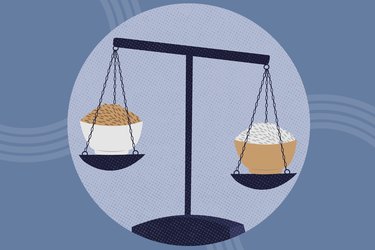
It's easy to understand why rice has been a staple carb across so many cultures for thousands of years: It's affordable, versatile and easy to prep.
But with the recent wave of low-carb diets (hello, keto) cropping up, carb vilification has knocked the go-to grain down a peg. So does rice deserve a place in your diet, or should you ditch it?
Video of the Day
Video of the Day
For our Ask the RDs series, we asked readers to send us their biggest nutrition questions and then posed the 12 most common to a panel of registered dietitians. Here's what they had to say about whether or not eating rice is healthy.
Is Rice Good for You?
"Yes, it's healthy to eat rice, but it depends on the type of rice you're choosing. I think it's a good idea to choose the whole-grain variety, such as brown rice or wild rice.
White rice is refined and, therefore, stripped of nutrients, whereas brown rice includes the whole grain, so you're getting more fiber in your diet. It could wind up saving you calories because the fiber in it could make you feel more full for a longer period of time.
I also think that you have to look at what your rice is taking the place of. If you're having white rice but you could otherwise put in barley or bulgar or even a whole-wheat pasta, I'd rather see that because you'd get a better variety of whole grains.
And just like any other food, I recommend variety with grains too, because no single food gives you everything you're looking for."
"Rice is a grain that can certainly fit into a healthy diet. Some people are concerned about arsenic in brown rice. But one of my number one nutrition messages is focusing on variety.
So, when people come to me and ask, 'What should I eat?' I always steer them to getting variety in the diet. Don't rely on one grain, don't rely on one protein, don't rely on one type of vegetable to get all of your nutrients. There's a reason why a varied diet is recommended: You know that you're getting a little bit of everything and you're hitting all your nutritional marks.
Exposure to arsenic is why I personally would not choose to eat brown rice every day. When you rotate things through and include a variety of foods, if there is an ingredient that also happens to have some sort of risk to it, you're minimizing the impact."
About Arsenic in Rice
According to a March 2016 report from the FDA, brown rice does contain higher levels of arsenic than white rice. But before you panic: The actual risk that arsenic in rice poses to your health is minimal, the report stresses, and rinsing your brown rice before you cook it can reduce the arsenic by up to 30 percent.
"It's absolutely healthy to eat rice. Even white rice after your workout is healthy. [The carbs help refuel your muscles.]
However, I recommend choosing brown rice, black rice or wild rice over white rice just because of the added fiber benefit. The average American gets about 12.5 grams of fiber per day, which is half the daily recommended amount. Any opportunity to get extra fiber is great.
I'd recommend accompanying rice with a protein to decrease its glycemic load [read: lessen its effect on blood sugar levels]. I definitely recommend having it with chicken and maybe some veggies for a balanced meal. Just watch portion sizes when we're talking about any carbohydrates.
And, lastly, focus on getting a balance of nutrients. I recommend rotating between rice, sweet potatoes, white potatoes and quinoa. But I wouldn't be concerned about arsenic in rice."
"If you really want to go for the healthiest rice out there, look to the many different varieties of brown rice popping up on store shelves. Try brown basmati.
I personally like the blends because you're getting a bunch of different grains in there. Often, wild rice has different whole grains in the mix. You may see a brown rice and quinoa mix — that's a good one.
For the healthiest rice, you want to look for the words 'whole grain' on the package's ingredient list. It will usually tell you how many grams of whole grains are in there, and the higher the better."
The Takeaway
Rice can be part of a healthy diet, but the type does matter. Skip white rice and instead opt for rice that has "whole grain" in the ingredient list. Brown rice, black rice, wild rice and rice blends that include other whole grains, such as quinoa, are all great options. The health risk of arsenic in brown rice is minimal, but you should still rinse it before cooking and avoid eating it every single day — incorporating a wider variety of grains into your diet is better for you, anyway.
Confused about nutrition? Get answers to more common questions in our Ask the RDs series.
Was this article helpful?
150 Characters Max
0/150
Thank you for sharing!
Thank you for your feedback!



